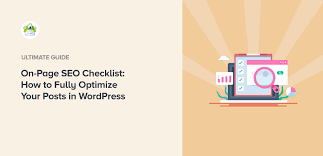The Power of On-Page SEO
Search Engine Optimization (SEO) is a crucial aspect of digital marketing, and on-page SEO plays a significant role in determining a website’s visibility and ranking on search engine results pages. By optimising various elements on a webpage, businesses can enhance their online presence and attract more organic traffic.
Key Elements of On-Page SEO
On-page SEO involves several key elements that need to be optimised for better search engine visibility:
- Title Tags: Crafting unique and descriptive title tags for each webpage helps search engines understand the content and purpose of the page.
- Meta Descriptions: Writing compelling meta descriptions not only improves click-through rates but also provides search engines with additional context about the page.
- Heading Tags: Proper use of heading tags (H1, H2, H3, etc.) helps structure content and improve readability for both users and search engines.
- Keyword Optimization: Strategic placement of relevant keywords throughout the content signals to search engines what the page is about.
- URL Structure: Creating user-friendly URLs that include target keywords can improve both user experience and search engine rankings.
- Image Alt Text: Adding descriptive alt text to images not only improves accessibility but also provides another opportunity to include relevant keywords.
The Impact of On-Page SEO
Effective on-page SEO can have a profound impact on a website’s performance in search results. By following best practices and optimising key elements, businesses can experience benefits such as:
- Improved Search Rankings: Websites that implement strong on-page SEO techniques are more likely to rank higher in search engine results pages for relevant queries.
- Increased Organic Traffic: Higher rankings lead to increased visibility, which can result in more organic traffic from users actively searching for related topics or products.
- Better User Experience: Optimised pages are easier to navigate, read, and understand, leading to improved user experience and engagement.
- Higher Conversion Rates: When users find relevant content easily through organic search, they are more likely to convert into customers or leads.
In Conclusion
In today’s competitive online landscape, on-page SEO is essential for any business looking to establish a strong digital presence. By focusing on key elements such as title tags, meta descriptions, keyword optimization, and more, businesses can enhance their visibility in search results and attract valuable organic traffic. Investing time and effort into on-page SEO practices can yield long-term benefits in terms of increased website traffic, improved user engagement, and ultimately, higher conversion rates.
Top 5 Essential On-Page SEO Tips for Enhancing Your Website’s Visibility
- Choose relevant keywords for each page
- Optimise meta tags (title, description) with keywords
- Create unique and descriptive page titles
- Include internal links to other relevant pages on your website
- Optimise images with descriptive alt text
Choose relevant keywords for each page
Selecting appropriate keywords for each webpage is a crucial aspect of on-page SEO. By identifying and incorporating relevant keywords that align with the content and purpose of the page, businesses can improve their chances of ranking higher in search engine results. Choosing the right keywords not only helps search engines understand the context of the page but also ensures that it reaches the intended audience effectively. Strategic keyword selection can significantly impact a webpage’s visibility, organic traffic, and overall performance in search rankings.
Optimise meta tags (title, description) with keywords
Optimising meta tags, including the title and description, with relevant keywords is a fundamental tip in on-page SEO. By incorporating targeted keywords into these elements, businesses can improve their website’s visibility and relevance to search engines. A well-crafted title tag not only informs users about the content of the page but also helps search engines understand its context. Similarly, a compelling meta description that includes relevant keywords can increase click-through rates and attract qualified traffic to the site. Strategic keyword optimisation in meta tags is a powerful way to enhance a website’s search engine performance and drive organic traffic effectively.
Create unique and descriptive page titles
Creating unique and descriptive page titles is a fundamental tip in on-page SEO. By crafting title tags that accurately reflect the content and purpose of each webpage, businesses can improve their visibility in search engine results. Unique page titles not only help search engines understand the relevance of the content but also attract users by providing a clear indication of what to expect when they click on the link. Incorporating relevant keywords strategically within these titles can further enhance SEO performance, making it easier for both search engines and users to identify and navigate to specific pages on a website.
Include internal links to other relevant pages on your website
Including internal links to other relevant pages on your website is a powerful on-page SEO strategy that can benefit both users and search engines. By linking to related content within your site, you not only provide visitors with additional valuable information but also help search engine crawlers discover and index more of your webpages. This practice enhances the overall user experience, encourages visitors to explore more of your site, and signals to search engines the interconnectedness and relevance of your content, ultimately boosting your website’s visibility and authority in search results.
Optimise images with descriptive alt text
Optimising images with descriptive alt text is a crucial aspect of on-page SEO. By providing detailed and relevant alt text for images, websites can improve accessibility for visually impaired users and also enhance the overall understanding of the content by search engines. Including target keywords in alt text not only helps search engines better index and rank the images but also contributes to the overall optimisation of the webpage. Effective use of descriptive alt text can boost organic visibility, user experience, and ultimately contribute to higher search engine rankings for the website.

